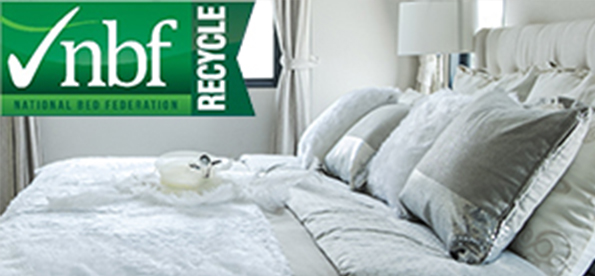
The National Bed Federation (NBF) has published its first policy document on the use and sale of used mattresses, components and materials. The policy aims to provide guidance on best practice, based on current processes.
Simultaneously the NBF, the trade association for UK manufacturers of mattresses and beds and their component suppliers, is also publishing a report commissioned earlier this year from environmental experts Oakdene Hollins, looking into recycling rates of mattresses by component part and announcing an ambitious goal of 75% diversion from landfill of old mattresses by 2028.
“Oakdene Hollins has been working with the NBF on measuring mattress recycling rates since 2014 but we realised breaking it down into component parts would give us more insights,” explained NBF President Tony Lisanti.
The report indicates that of the currently estimated 15-20% of mattresses that are diverted from landfill to recyclers, 96% of spring units, 85% of foams, 42% and 31% of polyesters and woven textiles respectively and zero non wovens are being recycled, but it also confirms that both 4% of spring units and 5% of foam are being sold on for re-use - in many cases back to the bed trade - supporting the NBF’s belief that a policy was needed.
Says Mr Lisanti: “Finding markets for the component parts of used mattresses is one of the challenges we need to overcome if we are to succeed in our goal of seeing 75% diverted from landfill by 2028. But the solutions must be acceptable to all concerned and certainly not deceive buyers or jeopardise their health and safety. We also felt clear guidance was needed to address the returns from today’s increasingly popular comfort trial guarantees. There is a challenge to distinguish between mattresses of unknown origin or age and those which are more easily identifiable as returns on the back of comfort trials.”
The NBF policy attempts to address what the Federation believes should be a best practice approach with regard to fitness for purpose and compliance with health and safety requirements. The policy seeks, at the very least, for any re-usage of components to be clearly declared.
“The more information a supplier can give, the better,” says Mr Lisanti. “Consumers have no way of knowing if that used spring unit is one month, one year or 20 years old. We also understand that ‘clean’ foam is in some cases being cut out of larger pieces for use in smaller mattresses. But currently there is no way that foam can be guaranteed to pass either flammability or cleanliness requirements.”
The policy also proposes fillings that have gone through a re-manufacturing process which involves appropriate cleaning, testing or mixing with other materials - and could hence be described as a new material - do not need to be identified as containing used components (unless the supplier deems it desirable from a marketing perspective!).
The new policy will form part of the next phase of the NBF’s Code of Practice – which since its introduction in 2014 has included requirements for cleanliness of fillings. “We are simply extending the current policy to clarify its application to used spring units and used mattresses as well as fillings,” said Mr Lisanti. “Our goal is not to ban their re-use or resale – but to ensure it is done in a responsible way and with full transparency for the buyers of these products.”
The NBF’s target of 75% diversion from landfill by 2028 has been proposed by the Federation’s Circular Economy Committee, after close consideration of the current recycling rates by the industry and local authorities.
“Since we started measuring the rates of mattress recycling in 2014 we have seen the level fluctuate considerably, as companies capable of processing mattresses for recycling have come and gone” says Mr Lisanti. “We believe the proportion has increased in the past couple of years – our new report, due out at the end of the year should confirm that – but considerable joint effort by the bed and waste industries, local authorities and policy makers will be required to reach our goal in the next 10 years. “The NBF is more than happy to continue to be a catalyst to make that happen.”